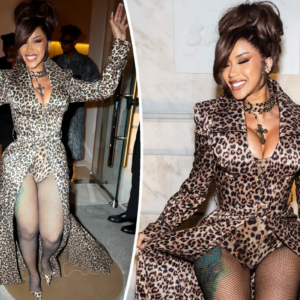How Vin Diesel the bouncer fought, danced and found his name
Vin Diesel attends the Mexico City premiere of “Fast X” at Plaza Toreo Parque Central in Naucalpan de Juarez on Monday. (Manuel Velasquez/Getty Images)
The days and nights couldn’t have looked any more different for Mark Sinclair, or the biceps he dubbed “the Kryptonics.”
During the day, the New York City dreamer juggled his off-Broadway roles in the ’80s with selling lightbulbs as a telemarketer. But at night, Sinclair did what he may have been known best for: fight unruly clubgoers as a bouncer at Tunnel, the Manhattan hot spot known for its rave and hip-hop scene.
In between those late-night brawls and early morning good times that started when he was 17, Sinclair picked up an alias that would be known to moviegoers who live their life a quarter-mile at a time: Vin Diesel.
Decades removed from his life as a bouncer, Diesel, 55, is among Hollywood’s highest-grossing actors thanks to his role as Dominic Toretto in the Fast and Furious franchise that’s spanned 22 years and brought in billions of dollars. The saga’s 10th film, “Fast X,” was released nationwide Friday, and it’s expected to be among the last times Diesel and the family hit the road.
But before the money, the memes and the many on-screen Coronas, Diesel was a struggling actor in his youth. The New York City kid gravitated toward acting thanks to his father, Irving H. Vincent, an acting instructor and theater manager. He grew up in the West Village’s Westbeth, the nation’s first federally subsidized arts colony, and he was obsessed with Dungeons and Dragons, Time magazine reported.
When he was 7, Diesel, his fraternal twin, Paul, and some friends broke into Manhattan’s Theater for the New City for a good time. Their mischief was upended by the theater’s artistic director, who responded with a proposition.
“I thought she was going to call the cops,” he said to CNN in 2002. “She said, ‘If you guys want to play here, come every day at 4 o’clock and learn your lines.’”
After appearing in his first play, Diesel found it difficult to consistently land roles. To help support his acting bug, he took a job as a bouncer at Tunnel around 1984. In the process, his body was changing, especially his biceps, which he named “the Kryptonics” after the skateboarding wheels of the ’70s.
“At 17 years old, I was working at the clubs to keep my days free to go on auditions,” he said to Industria in 2013. “I wasn’t getting a lot of work as an actor, and I spent a lot of time in the gym.”
When it came to nightlife in New York in the ’80s and ’90s, Tunnel was one of the city’s most famous clubs. The enormous tunnel-shape building constructed in the early 1900s gave the club its identity, spanning a city block on Manhattan’s 11th Avenue. While it was the place to be for techno and house music, the club also fostered a booming hip-hop community after promoter Peter Gatien took over in 1992. The club ushered in the era of the “Tunnel banger,” an aggressive track that got the crowd bumping after 1 a.m., according to Complex.
Tunnel was so hot that it attracted a variety of clubgoers, including some who were likely to throw down at any given moment.
“Whatever was going on in the street was going on in the Tunnel. It was a tough place to work, and it was a tough place to leave at night,” Glen Beck, who was a bouncer and co-owner of Emissary Security Group, told Complex in 2012. (No, not conservative commentator Glenn Beck.) “Bouncers went home together, just in case. We’re not talking about some punk dudes; we’re talking about really tough guys.”
From the start, Diesel said he did not want to be a victim in life. Becoming a bouncer allowed him, in his own words, to be “a gunslinger for hire” against the Tunnel patrons who were looking to drink, fight or both.
Share this articleShare
“When I first started, it was all fighting,” Diesel, who was also a bouncer at Mars in New York’s Meatpacking District, told Industria. “I must have been in hundreds of fights, and they weren’t pretty.”
He told Men’s Journal in 2017, “I was kicking [butt] on a nightly basis, which helped with the frustration of not landing parts.”

Diesel tapes a segment on the track before the Formula One Miami Grand Prix on May 4. (Wilfredo Lee/AP)
Yet he needed some sense of security — and to not be addressed as Mark Sinclair. He once told O’Brien that the “Vin” was easy because it was a shortened version of his father’s last name. The “Diesel” part, he said, came from friends who described him as full of energy.
From then on, Vin Diesel was ready to fight, even though he tried his best “to avoid violence” whenever possible.
Rapper Busta Rhymes remembered Diesel fondly from his nights working the door at Tunnel.
“Real talk, he used to break faces in the Tunnel,” Rhymes said in a social media video, Diesel laughing next to him.
His time at Tunnel wasn’t just about fights. There was dancing — lots and lots of dancing. An instructional break-dancing video of a young Diesel — with a full head of hair — has been shown repeatedly on daytime and late-night shows. Ricky Marcado, a former manager at Tunnel, recalled in 2002 how Diesel couldn’t stay away from the club.
“He would come in on his nights off and dance by himself,” Marcado said to CNN. “People would stop and watch him.”
Around the time Diesel left Tunnel, his luck in acting began to change. In 1995, he wrote, directed and starred in the short film “Multi-Facial,” a film that would begin to change friends’ and family members’ perception of his other work, he told the New York Times in 2017.
“Everyone just thought I was the bouncer who did theater on Off-Off Broadway,” he said. “Then I showed the movie and 20 minutes later, when the movie ended, the whole audience never looked at me the same. Friends from my neighborhood, friends who bounced with me, even my own parents, they looked at me so differently. I can’t even describe it.”
Diesel and the club where he made his name as a bouncer went in opposite directions in 2001. In June of that year, Diesel starred in “The Fast and the Furious,” a No. 1 hit that earned $40 million in its opening weekend and made the actor a box-office attraction. Two months later, Tunnel shut down after not paying nearly $2 million in rent. The club had been the scene of a shooting, a stabbing and a fatal drug overdose, and Gatien, the owner, later pleaded guilty to tax evasion, according to the Times.
Decades and dozens of films later, Diesel admitted to Men’s Journal that the lessons he took as a bouncer proved valuable to him when he became the heartbeat of his Fast and Furious family.
“I was a bouncer for nine years — it was all I knew how to do — and my training was to not talk loosely, reveal my [stuff] to strangers,” he said. “That’s still my thought process all these years later: Shut your mouth, watch your back, and keep working till your [butt] falls off.”
Relative Articles
None found






